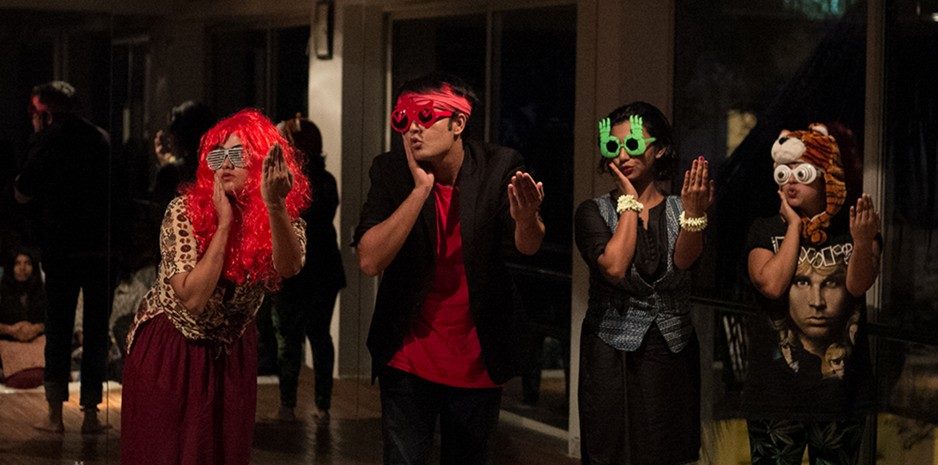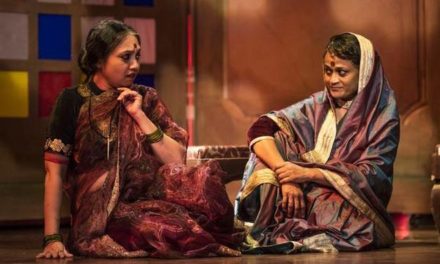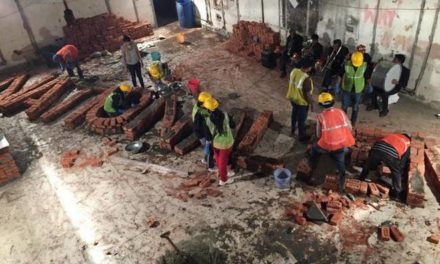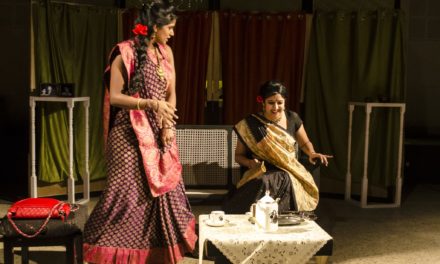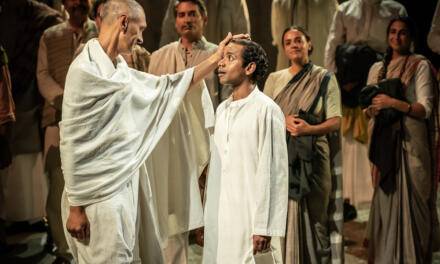In Andheri, eight performers play up-and-coming actors reflecting the ruthlessness of getting into Hindi cinema.
Mumbai is the fabled city of dreams for Indians, beckoning many youngsters who aspire to make it big in Bollywood. While some get lucky, most end up waiting for that one break.
A Hindi play by a Mumbai-based theatre group, The Mirror Merchants, chronicles the lives of eight such people and the choices they make to fulfil their dreams. Titled Andheri, it depicts the usual stereotypes but also portrays some beguiling myths. For instance, there’s a good-looking actor who has the potential to become a leading man but is happy with supporting roles. His idealistic theatre artist friend doesn’t want to sell out, even though he is riddled by a financial crisis. On the other hand, a gym rat believes that all one needs to become a superstar is a good physique, while an actress does not mind surrendering herself to the casting couch.
Writer-director Arnesh Ghose, who is also a film journalist and founder of The Mirror Merchants, says the script is based on real stories he has heard over many years. “All the characters in the play are telling the story of the city of dreams through various perspectives,” Ghose says. “We Mumbaikars are desensitised towards Bollywood and the story of struggles as we live so close to the industry.” He admits that many films have tackled similar subjects, but he has always wondered why a full-fledged play has never been staged to reflect the struggle. “I thought it was high time that we talk about this dark, human, grim aspect of the city and deal with it on stage.”

Reflecting reality: Andheri is based on stories writer-director Arnesh Ghose has heard over many years.
Though the play deals with a seemingly serious subject, Ghose has ensured that it is generously laced with humour. “I wanted the piece to be a dark comedy that is engaging and provocative. As a person who is helming it, I wanted to be very objective and non-judgemental about the choices that the characters in the play make. After all, many people are vying for the same role in Bollywood and all of them are talented, so how do you decide who will get it? No wonder, these strugglers find whatever way they can to land that role. Also, comedy gives you the scope to be a little irreverent, but get the message across effectively.”
The title of the production is an innuendo for both for the darkness that lurks behind the limelight and the Mumbai suburb that is home to many Bollywood hopefuls. “The future is always dark when you are a part of the Hindi movie industry. No matter how famous or well-established you are, you do not know what the future holds for you, which film will be your death knell.” He adds that small-time actors are struggling every day to crack a role in a film, serial, ad film or a web series. Should they get a role, these actors are able to enjoy the high of being on the set only for a few days. Soon, the reality of the uncertainty of the next project sets in. “There is a continuous need to be in the spotlight; they know that if they commit one mistake, they are doomed as the competition is so tough.”
Keeping in sync with the spirit of the production, the play features music from ’90s Hindi cinema. “That decade defined how absolutely inane or insane we could be. But the melody of those songs was distinct. The music in my play is unabashedly Bollywood, as that’s where these actors are aspiring to be. The background score is typically what we used to see in Hindi movies, replete with shehnai and sitar to denote sorrow,” says Ghose.
This article was originally published in The Hindu. Reposted with permission. Read the original article here.
This post was written by the author in their personal capacity.The opinions expressed in this article are the author’s own and do not reflect the view of The Theatre Times, their staff or collaborators.
This post was written by Rinky Kumar.
The views expressed here belong to the author and do not necessarily reflect our views and opinions.

